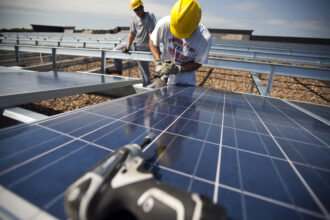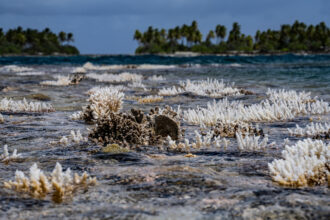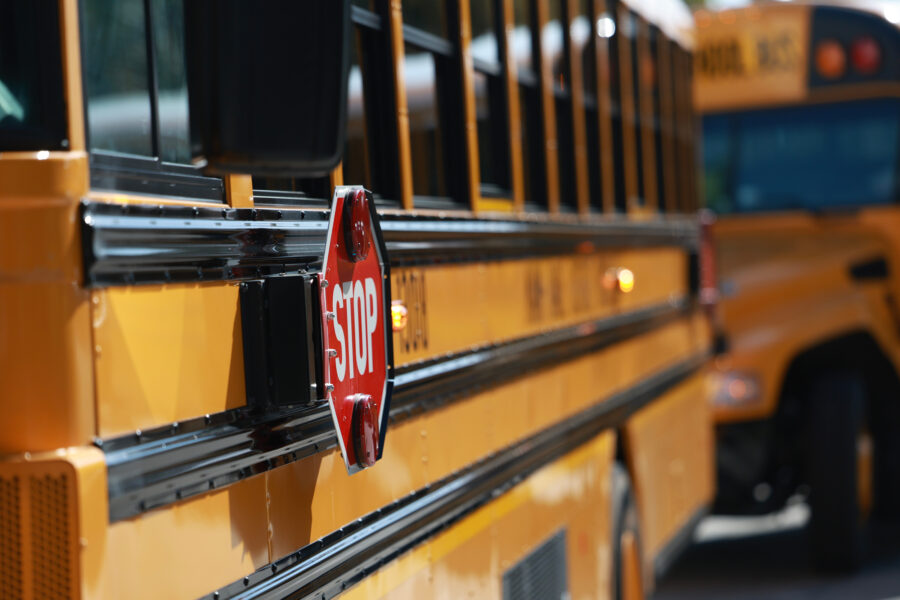Global Forum Seeks to Avert Water Crisis (Reuters)
Officials from 120 countries meet with scientists in Istanbul this week to discuss how to avert a global water crisis. Nearly half of the world’s people will be facing acute water shortage by 2030, the UN warns.
Shell Scores Poorly on Emissions Disclosure (Financial Times)
Royal Dutch Shell’s disclosure of its carbon emissions lags behind its closest rivals and falls well short of best practices, a study by an industry consultant says.
Japan to Seal Carbon Deal with Ukraine (Reuters)
Japan is set to complete a deal this week to buy emissions rights from Ukraine, marking its first deal via a government-to-government trading scheme under the Kyoto Protocol, a Japanese government source said today.
Scientists Drill Deep in Arctic for Climate Change Insight (Boston Globe)
A hardy band of scientists, undeterred by white-out blizzards or 40-below-zero cold, today sent a drill through the floor of a Siberian crater lake and deep into the earth. From there, they hope to extract an unparalleled record of climate change.
Casey Joins Filibuster Threat Against Cap-and-Trade (Wonk Room)
Sen. Robert Casey (D-Pa.) has joined conservatives who want to preserve the threat of a filibuster against legislation to fight global warming pollution.
Small-Scale Solar Seeks Its Own Incentives (Las Vegas Sun)
Labor unions are backing a bill in Nevada that would carve out special requirements and give utilities the money and incentive to promote rooftop solar installations.
Drilling stalled in Allegheny National Forest (Post-Gazette)
The U.S. Forest Service hasn’t approved any new gas or oil wells in the Allegheny National Forest for almost two months, delaying oil and gas development and causing at least one company to consider drilling without federal approval.
EPA to Withdraw from Feedlot Agreements (Agweek)
The EPA is withdrawing from two Idaho agreements concerning the regulating of animal feedlots, saying says confined-animal feeding operations have become a national priority and it plans to play a more direct role in inspection and enforcement.
Universities Experimenting with Biochar (BBC)
A German university is experimenting with a process for creating biochar that produces both gas for energy generation and charcoal, a stable form of carbon that can help plants grow.
Study: Warming Will Make NY More Vulnerable to Storm Surges (Bloomberg)
A study in the journal Nature Geoscience says sea levels along the Northeast should rise 8.3 inches more than the global mean level sea rise by 2100, putting New York City at risk of severe flooding from storm surges.
Scientists Plan to Drive the Icy Northwest Passage (Reuters)
A group of scientists plans to drive the Northwest Passage to learn more about what happens to the microbes left behind by humans as they explore remote areas.
Climate Change Blues: How Scientists Cope (AFP)
Being a climate scientist is not for the faint of heart. Few areas of research yield sharper contrasts between a steady stream of "eureka!" moments and their implications. What haunts scientists most is the feeling that, despite an overwhelming consensus, the public doesn’t see just how close Earth is to climate catastrophe.
About This Story
Perhaps you noticed: This story, like all the news we publish, is free to read. That’s because Inside Climate News is a 501c3 nonprofit organization. We do not charge a subscription fee, lock our news behind a paywall, or clutter our website with ads. We make our news on climate and the environment freely available to you and anyone who wants it.
That’s not all. We also share our news for free with scores of other media organizations around the country. Many of them can’t afford to do environmental journalism of their own. We’ve built bureaus from coast to coast to report local stories, collaborate with local newsrooms and co-publish articles so that this vital work is shared as widely as possible.
Two of us launched ICN in 2007. Six years later we earned a Pulitzer Prize for National Reporting, and now we run the oldest and largest dedicated climate newsroom in the nation. We tell the story in all its complexity. We hold polluters accountable. We expose environmental injustice. We debunk misinformation. We scrutinize solutions and inspire action.
Donations from readers like you fund every aspect of what we do. If you don’t already, will you support our ongoing work, our reporting on the biggest crisis facing our planet, and help us reach even more readers in more places?
Please take a moment to make a tax-deductible donation. Every one of them makes a difference.
Thank you,











